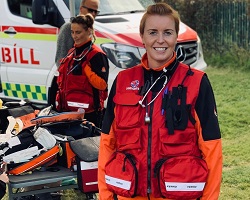Helga Rósa Masdottir – emergency care nurse coordinator in Iceland

Helga R. Masdottir
Helga Rósa Masdottir has always had a strong work ethic. “My first posting as a nurse was at Neskaupstaður, in the far east of Iceland, a place of fjords and mountains. Together with two newly graduated friends, I worked in the only hospital in the area which was a port of call for sailors and seafarers. Patients who could not be treated at our hospital were driven to the nearest airport, which was an hour away, to take the hour-long flight to the capital Reykjavik,” she remembers.
“We had to learn to depend on ourselves. I nursed people of all ages – from babies to the elderly and everyone in between. I have very fond memories of that time as it deepened my understanding and strengthened my ability to cope regardless of the circumstances, to rely on my knowledge and skills,” says Helga, who is now Head Nurse at Landspitali, the National University Hospital in Reykjavik, Iceland.
“What I learned in my first job helped me in 2006, when I first began working in Reykjavik’s Landspitali Hospital’s emergency department as a nurse coordinator. Sometimes the waiting room would already be crowded and an ambulance would arrive with another patient. Because the hospital is the last resort for trauma care for the entire country, we cannot turn away any patient.
“In those cases, I thought of myself as a general at war. Only instead of seeking to inflict as much damage as possible, the goal was the opposite, to heal and cure. It is challenging to decide where to direct your forces, whom to send to battle, and it is crucial to rely on your own judgement.”
Communication is everything
A master’s in nursing in Canada, several placements, and three boys of her own later, Helga recently became Head Nurse at that same hospital in Reykjavik.
“I will be overseeing more than 200 people. In this position, effective and efficient communication comes first, second and third.
“The ability to reach out to people, to identify and solve conflicts, and to tackle problems head-on – those are prerequisites for the job. Excellent communication and people skills are crucial for everyone working in the emergency department.
“I also have administration responsibilities to address the financial, clinical and staffing side of things,” explains Helga.
Always thinking ahead
“One of the most challenging tasks is to ensure that positions during all shifts are manned and determine which patient needs immediate attention. Setting priorities and intervening in a timely manner is paramount if patients are to receive the right help at the right time from the right personnel.”
Helga is thankful for the support she receives from her children and from her husband, who works in civil protection and whom she met on a simulation exercise for large-scale emergency crises.
“We health care professionals train to make sure we are prepared for any event. Cultivating this mindset is something I learned from my mother, who was also a nurse and a mentor to me. This is also advice I would give to all young nurses.
“To be a good nurse, you need to know your patients and have the education and clinical experience necessary to do your job. If a patient comes in with a complaint, you should consider potential future developments and know what to do to prevent something worse from happening. We always have to be a step ahead.”



